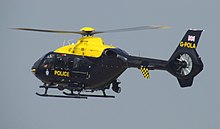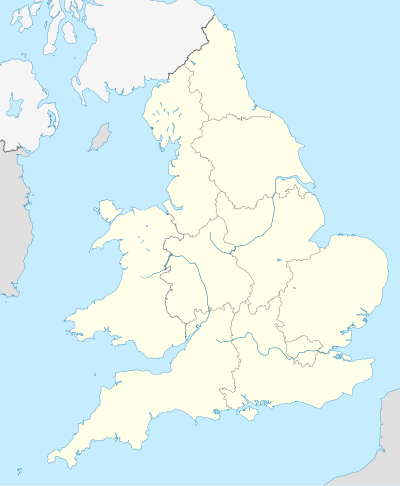National Police Air Service
| National Police Air Service | |
|---|---|
 | |
| Active | 1 October 2012–present |
| Country | |
| Type | Police aviation |
| Operations jurisdiction | England Wales |
| Headquarters | West Yorkshire Police Operations Centre, Wakefield, England |
| Abbreviation | NPAS |
| Equipment | |
| Aircraft | Airbus Helicopters H135 Airbus Helicopters H145 Vulcanair P68R |
| Website | |
| www | |
The National Police Air Service (NPAS) is a police aviation service that provides centralised air support to the 43 territorial police forces in England and Wales, as well the three special police forces serving that area.[1] It replaced the previous structure whereby police forces operated their own helicopters, either individually or in small consortia (such as the South East Air Support Unit).[2] The project was coordinated by Alex Marshall (the then Chief Constable of Hampshire Police).[3] West Yorkshire Police is the lead force,[3] and the service is coordinated from the NPAS Operations Centre, at Wakefield, West Yorkshire.[4]
History[]
Rollout[]
NPAS became operational on 1 October 2012,[5] and was rolled out across England and Wales in stages.[3] The service provides 19 helicopters and four fixed wing aircraft, operating from 14 bases.[6]
NPAS suggested that the Police Scotland Air Support Unit join the service to reduce costs.[7] However that did not materialise.
Base closures[]
In February 2015, it was announced that, due to a 14% cut in revenue over the following three years, NPAS would be closing ten bases over two years.[8]
Fixed wing operations[]
In response to slashed budgets, NPAS investigated the use of fixed wing aircraft, which are cheaper to fly and maintain. A new aeroplane base was created at Doncaster Airport, housing four fixed wing Vulcanair P68R aircraft.[9] This became operational in early 2020.[10]
Criticism[]
There was some initial criticism from forces around the service provided by NPAS when it began operation. This was primarily due to the reduction in number of bases and aircraft available, following general cuts by the UK Home Office to police funding. This led to Her Majesty's Inspectorate of Constabulary and Fire & Rescue Services (HMICFRS) conducting a case study of NPAS with its conclusions made public on 30 November 2017. The report commented at some length on the governance and funding of the service provided. The report specifically stated that there was no criticism of NPAS staff or its operational delivery. HMICFRS included the following observation in its press release:[11]
With the number of bases being halved and the number of aircraft being cut by a third in the last 10 years, savings have primarily been made by cutting the service provided to forces rather than increasing efficiency. An inconsistent service means that many incidents requiring air support are over before a police helicopter can arrive. Moreover, we are concerned that the police service now operates insufficient aircraft to provide a consistently prompt response to incidents in all forces in England and Wales.
— HMICFRS, Planes, drones and helicopters: an independent study of police air support
Fleet[]


- Eurocopter EC135 (Airbus H135) - 15[12]
- One additional H135, formerly on long-term lease with the Norwegian Police Service, now serves exclusively as a training helicopter for new tactical flight officers[13]
- Airbus Helicopters H145 - four[12]
- Vulcanair P68R - four[12][14]
Map of NPAS bases[]

See also[]
References[]
- ^ "National Police Air Service | West Yorkshire Police". www.westyorkshire.police.uk. Retrieved 18 June 2020.
- ^ "New plans for a national police air service". Association of Chief Police Officers. 26 October 2010. Archived from the original on 4 January 2013. Retrieved 5 January 2012.
- ^ a b c "Press Release: National Police Air Service is launched". Association of Chief Police Officers. 1 October 2012. Archived from the original on 4 October 2012. Retrieved 1 October 2012.
- ^ "NPAS Annual Report 2014 - 2015" (PDF). NPAS. 27 January 2016.
- ^ "New police air service takes off". BBC News Online. 1 October 2012.
- ^ "NPAS Aircraft FAQs | NPAS". www.npas.police.uk. Retrieved 12 January 2017.
- ^ PROTECT - CONTRACTS, Scottish Police Authority.
- ^ "Police to cut 10 helicopter bases". BBC News. 20 February 2015. Retrieved 13 July 2020.
- ^ "Four Vulcanair P68Rs are on the beat for NPAS from Doncaster". wearedoncaster.co.uk. Retrieved 13 July 2020.
- ^ Harding, Nick (7 March 2020). "Police get four new fixed-wing eyes in the sky". UK Aviation News. Retrieved 13 July 2020.
- ^ "National Police Air Service needs urgent reform". HMICFRS. Retrieved 30 November 2017.
- ^ a b c Drwiega Air International October 2015, p. 126.
- ^ UKEmergencyAviation [@ukemav] (11 June 2019). "Redacted contract: www.blpd.gov.uk/foi/foicontractview.aspx?contractid=39897 … - St Athan 'may relocate to NPAS Cardiff' - NPAS intends to operate 1x 135T2+ 'for training purposes only'; however in a clarification, the training a/c LN-OCB 'will no longer be part of the NPAS fleet for the purposes of this contract' twitter.com/airbusheli/status/1102956610266255360 …" (Tweet). Retrieved 12 June 2019 – via Twitter.
- ^ Craig, Peter (20 August 2019). "New police planes to patrol skies over North East Lincolnshire". Grimsby Live. Retrieved 29 February 2020.
- ^ "- Bases map". National Police Air Service. Retrieved 26 November 2021.
- Drwiega, Andrew (October 2015). "Police Aviation's Transformation". Air International. Vol. 89 no. 4. pp. 126–127. ISSN 0306-5634.
External links[]
| Wikimedia Commons has media related to National Police Air Service. |
- Police aviation units of the United Kingdom